人教版(2019)选择性必修第三册Unit 5 Poems Discover Useful Structures 定语从句复习课件 (共33张PPT)
文档属性
| 名称 | 人教版(2019)选择性必修第三册Unit 5 Poems Discover Useful Structures 定语从句复习课件 (共33张PPT) | 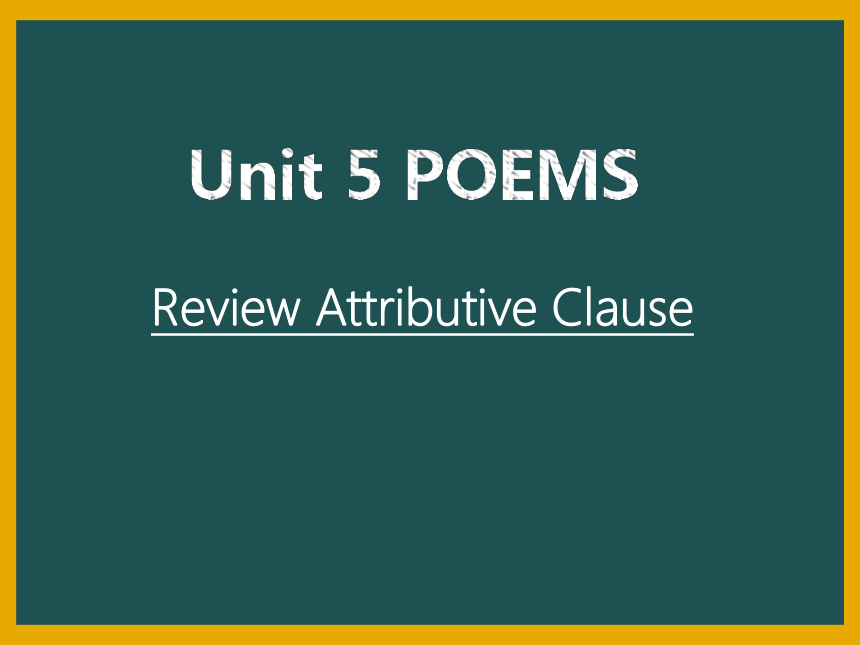 | |
| 格式 | pptx | ||
| 文件大小 | 2.1MB | ||
| 资源类型 | 教案 | ||
| 版本资源 | 人教版(2019) | ||
| 科目 | 英语 | ||
| 更新时间 | 2024-03-02 10:48:18 | ||
图片预览

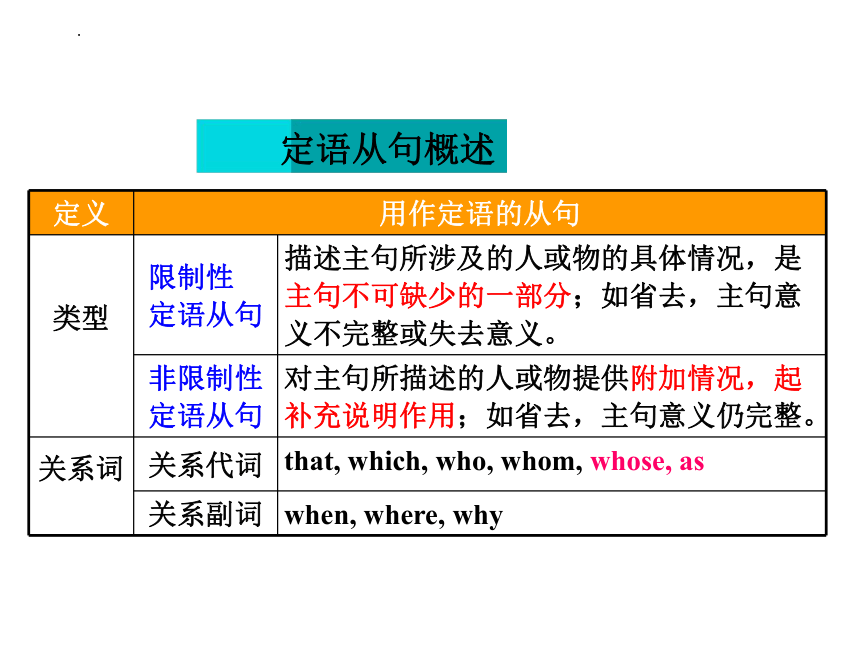
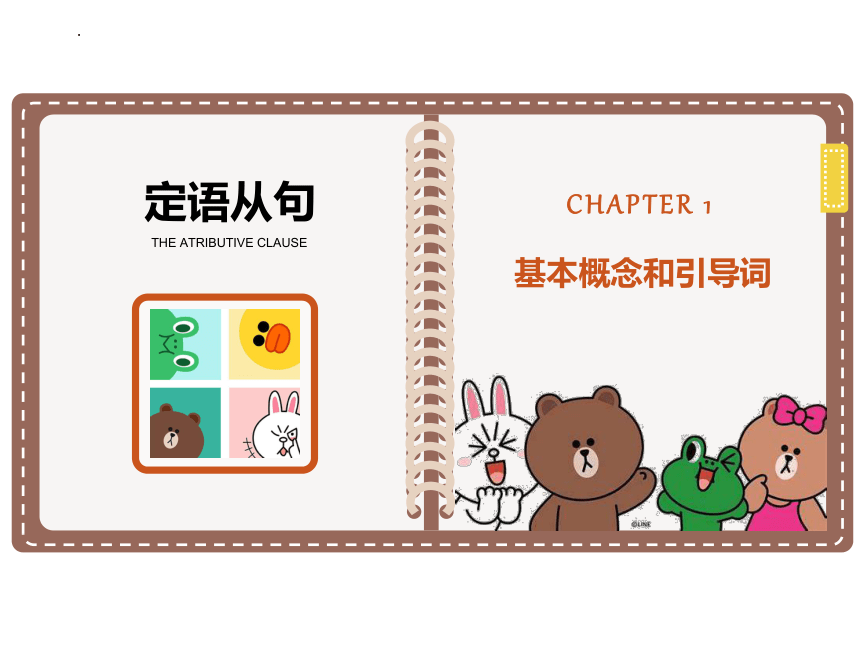
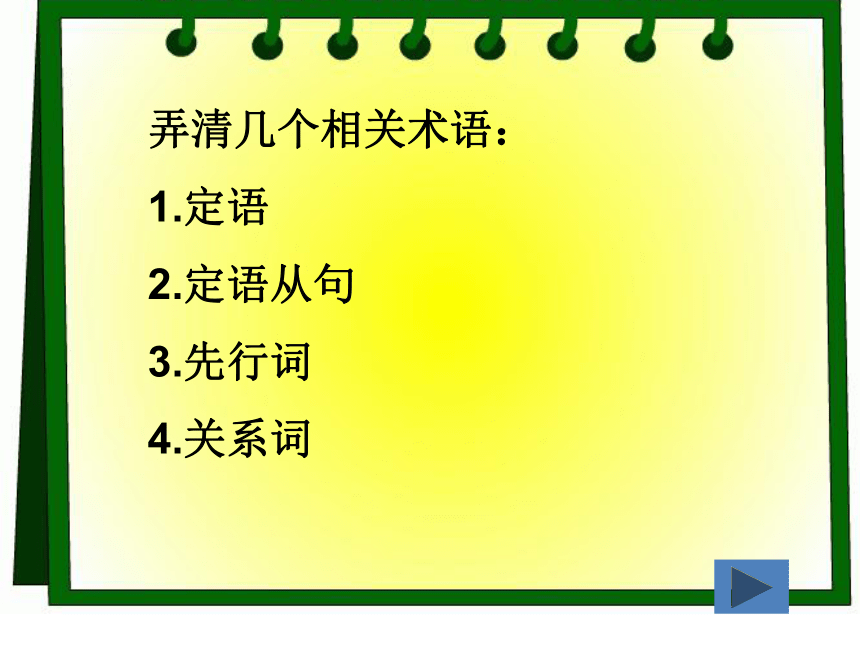
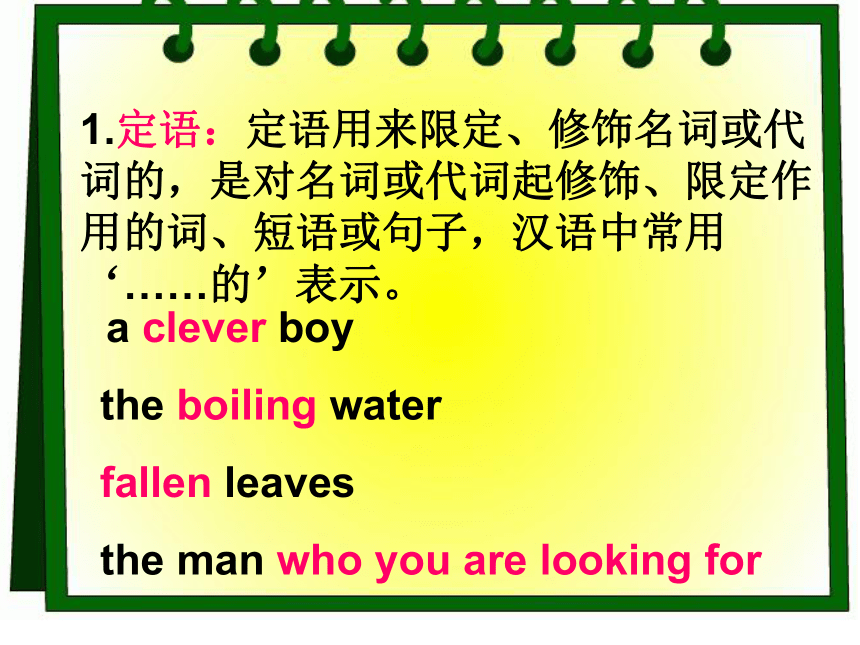
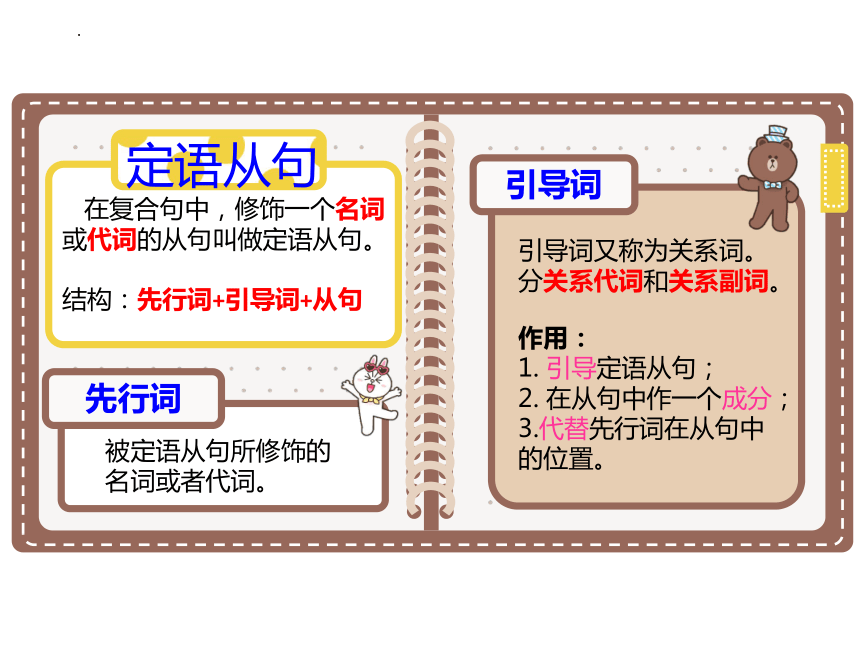
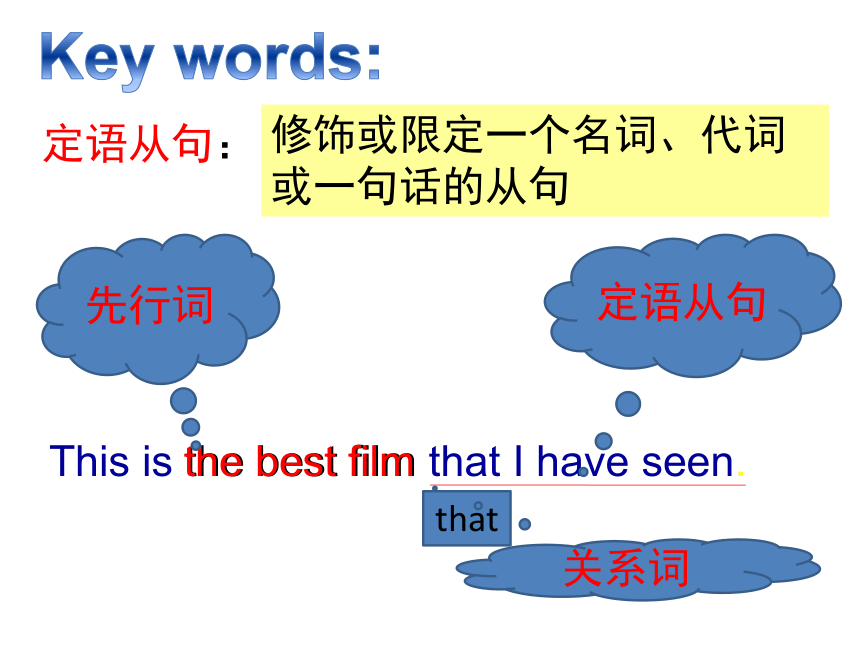
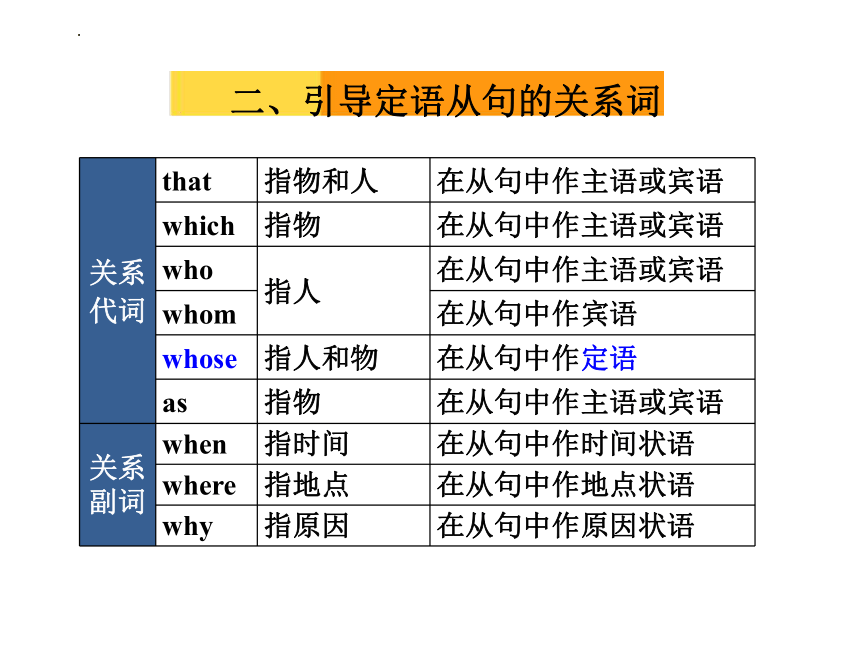
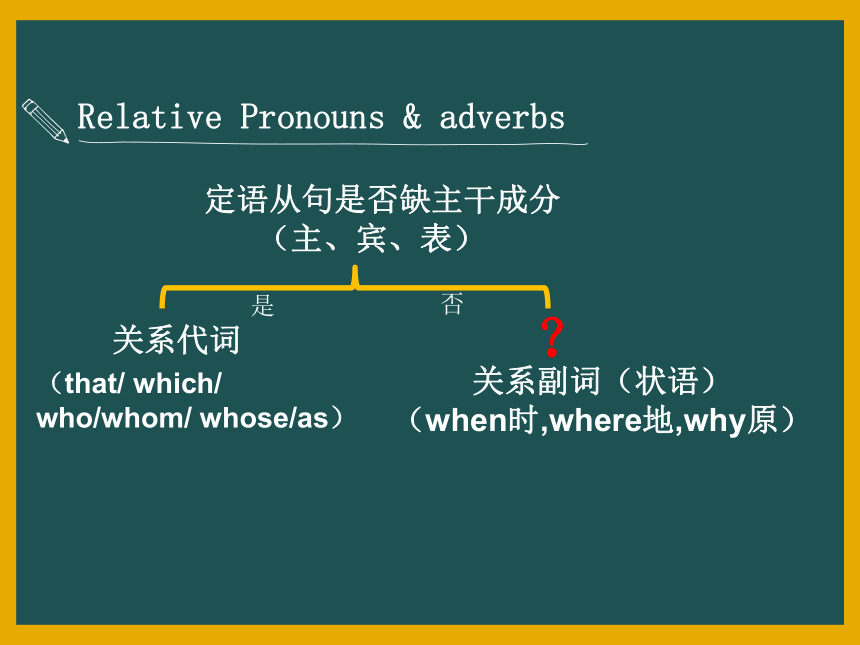
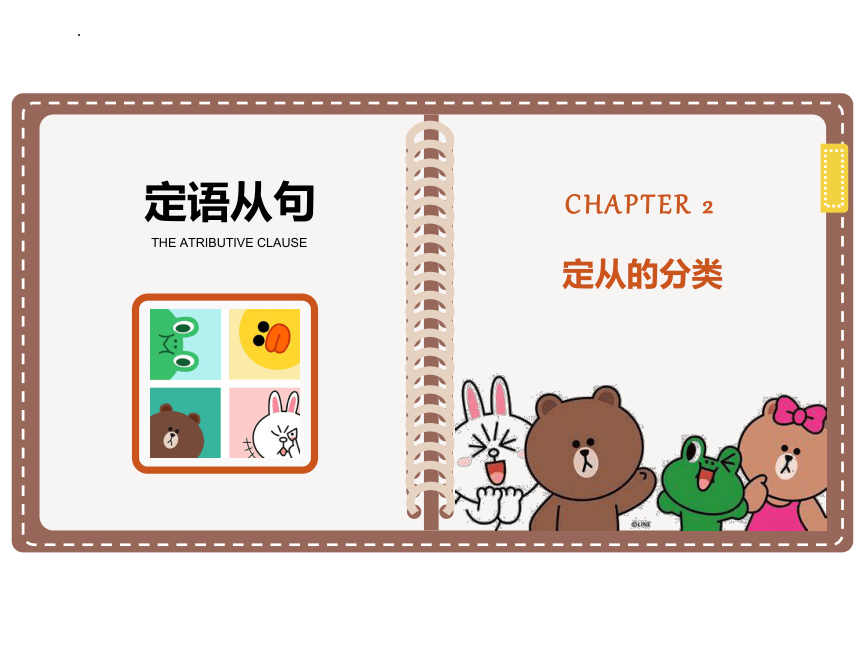
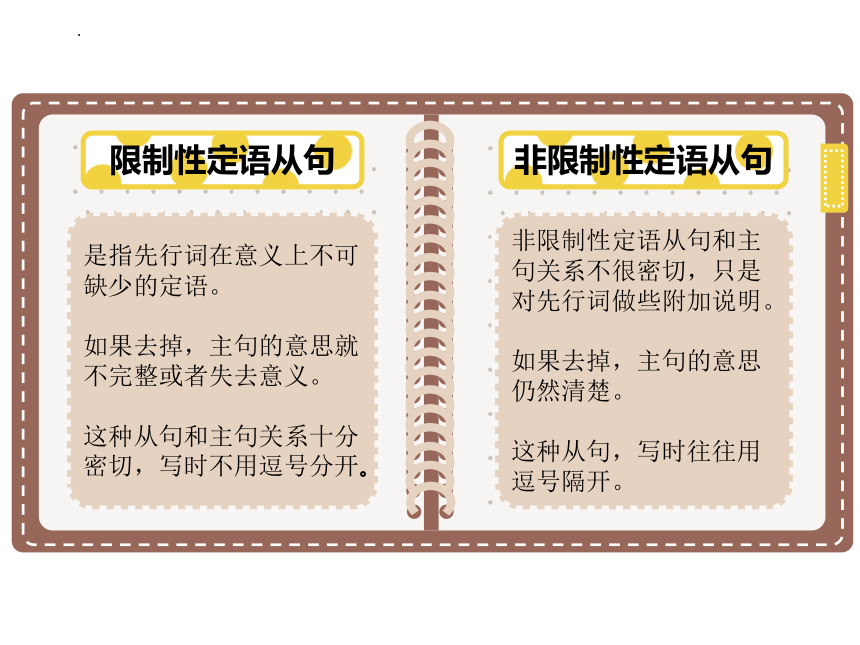
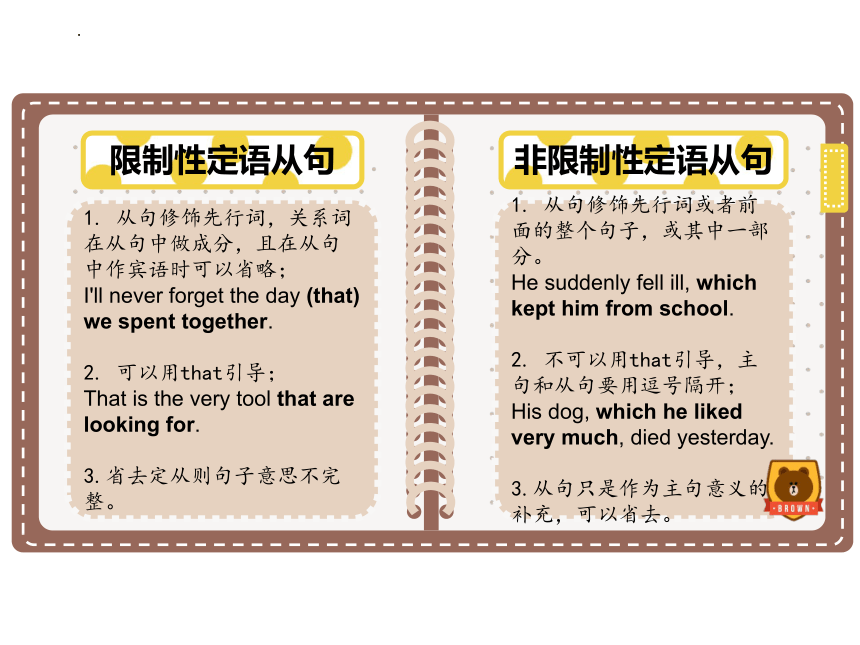
文档简介
(共33张PPT)
Unit 5 POEMS
Review Attributive Clause
定义 用作定语的从句
类型 限制性 定语从句 描述主句所涉及的人或物的具体情况,是主句不可缺少的一部分;如省去,主句意
义不完整或失去意义。
非限制性 定语从句 对主句所描述的人或物提供附加情况,起补充说明作用;如省去,主句意义仍完整。
关系词 关系代词 that, which, who, whom, whose, as
关系副词 when, where, why
定语从句概述
定语从句
THE ATRIBUTIVE CLAUSE
CHAPTER 1
基本概念和引导词
弄清几个相关术语:
1.定语
2.定语从句
3.先行词
4.关系词
1.定语:定语用来限定、修饰名词或代词的,是对名词或代词起修饰、限定作用的词、短语或句子,汉语中常用‘……的’表示。
a clever boy
the boiling water
fallen leaves
the man who you are looking for
在复合句中,修饰一个名词或代词的从句叫做定语从句。
结构:先行词+引导词+从句
定语从句
先行词
引导词
被定语从句所修饰的名词或者代词。
引导词又称为关系词。
分关系代词和关系副词。
作用:
1. 引导定语从句;
2. 在从句中作一个成分;
3.代替先行词在从句中的位置。
Key words:
定语从句:
修饰或限定一个名词、代词或一句话的从句
This is the best film that I have seen.
定语从句
the best film
先行词
that
关系词
关系代词 that 指物和人 在从句中作主语或宾语
which 指物 在从句中作主语或宾语
who 指人 在从句中作主语或宾语
whom 在从句中作宾语
whose 指人和物 在从句中作定语
as 指物 在从句中作主语或宾语
关系副词 when 指时间 在从句中作时间状语
where 指地点 在从句中作地点状语
why 指原因 在从句中作原因状语
二、引导定语从句的关系词
Relative Pronouns & adverbs
定语从句是否缺主干成分
(主、宾、表)
是
否
关系代词
(that/ which/ who/whom/ whose/as)
?
关系副词(状语)
(when时,where地,why原)
定语从句
THE ATRIBUTIVE CLAUSE
CHAPTER 2
定从的分类
是指先行词在意义上不可缺少的定语。
如果去掉,主句的意思就不完整或者失去意义。
这种从句和主句关系十分密切,写时不用逗号分开。
非限制性定语从句和主句关系不很密切,只是对先行词做些附加说明。
如果去掉,主句的意思仍然清楚。
这种从句,写时往往用逗号隔开。
限制性定语从句
非限制性定语从句
1. 从句修饰先行词,关系词在从句中做成分,且在从句中作宾语时可以省略;
I'll never forget the day (that) we spent together.
2. 可以用that引导;
That is the very tool that are looking for.
3.省去定从则句子意思不完整。
限制性定语从句
1. 从句修饰先行词或者前面的整个句子,或其中一部分。
He suddenly fell ill, which kept him from school.
2. 不可以用that引导,主句和从句要用逗号隔开;
His dog, which he liked very much, died yesterday.
3.从句只是作为主句意义的补充,可以省去。
非限制性定语从句
定语从句易错点
关系代词 vs关系副词
先行词为抽象地点where引导的定语从句
不能用which或不能用that的情况
介词+关系代词引导的定语从句
whose引导的定语从句
as引导的定语从句
定语从句和其他句型
This is the reason ___________ he explained at the
meeting.
2. This is the reason _______ I want to quit my job.
关系代词 关系副词
1.We visited a factory _________ makes toys for children.
2.We visited a factory ______ toys are made for children.
1. I’ll never forget the day _______ we first met.
2. I’ll never forget the day ___________ I spent with you.
which/that
where
which/that
when
The way _____________ he explained the sentences to
us was easy to understand.
2. The way ____________ he told me is practical.
that/in which
which/that
定语从句中,如果缺少主语或宾语,则用关系代词(that/which);
如果不缺主语或宾语而缺状语,则用关系副词(when/where/why).
why
which/that
or
先行词为抽象地点 引导的定语从句
where
He often got himself into such a situation _______
everything could happen.
2. Are you facing a situation ____________ looks
impossible to fix
3. I have reached a point in my life _____ I am supposed
to make decisions of my own.
4. Reading is an activity __________ people enjoy a lot
in their free time.
case,situation,point,scene,activity,stage,spot等抽象的地点名词,在从句中作状语时,用where引导;
作主语或宾语时,用that/which.
where
which/that
where
where
All ____ is needed is money and hands.
The third place _____ we are going to visit is Hangzhou.
He’s the only boy in our city ____ enters the Beijing University.
She described in her compositions the people and places ______ impressed her most.
Who is the girl _____ drove the car
不能用which 不能用that
v.s
He came up with a suggestion, _______ proved to be more than practical.
This is the great moment to ________ I look forward.
that
that
that
that
that
which
which
1.当先行词是指物的 不定代词或被不定代词所修饰时
2.当先行词是序数词、形容词最高级或被其修饰时
3.当先行词被 the very, the only, the next, the last等所修饰时
4.当先行词为指人和指物的两个并列名词词组时
5.当主句是以who或 which 开头的特殊疑问句时。
2.当先行词是物,且关系词位于介词后时,不能用that
1.引导非限定性定语从句时,不能用that
+
介词 关系代词
Do you know the boy ___ ____ your mother is talking
2. He gave me some novels _____ ______ I am not very familiar.
3. I still remember the day ___ ______ I first got to Paris.
4. He has three brothers, ____ ______ Li Lei is the youngest one.
根据介词和定语从句中动词的习惯搭配。
根据介词和定语从句中形容词的习惯搭配。
根据介词和先行词的习惯搭配。
在非限制定语从句中表示”所有关系”或”整体中的一部分”,用of which/of whom
to whom
with which
on which
of whom
= the + n. + of which/whom
whose
1. The river _______ banks are covered with trees flows to the sea.
2. Her parents wouldn’t let her marry anyone _______ family was very poor.
3. I made a table, ______ surface is quite smooth.
I made a table, _________________ is quite smooth.
I made a table, _________________ is quite smooth.
whose
whose
whose
the surface of which
of which the surface
whose引导定语从句时,通常可与of which/of whom引导的定语从句进行转换。
whose 是定语从句中一个常用的关系代词,在从句中作定语,也就是说当先行词与从句中某个名词有所属关系,表示“……的”,它既可以指代人,也可以指代物,既可引导限制性定语从句,也可以引导非限制性定语从句。
的用法
as
As引导的限制性定语从句
1. This is such an interesting book ____ we all like.
2. This is so interesting a book _____ we all like.
3. He is as clever a boy ____ you can imagine.
as引导限制性定语从句先行词前常被such, the same, so, as 修饰,即构成such…as , the same …as, so…as, 结构,做题时容易忽略。as在定语从句中应充当成分如:主语、宾语或表语。
as
as
as
1. _____ is announced in today’s newspaper, we must improve our style of work.
2. He married her, _____ we had expected.
3. Things will turn out contrary to one’s wishes, _____ is often the case.
As引导的非限制性定语从句
as引导的从句,指代整个主句,可位于主句之前之中或之后。
as 引导从句时,有“正如”之意。
常用as引导的结构:
As
as
as
as is well known/ is known to all
as has been said before
as has been already pointed out
as we all can see
as is expected/ hoped/ supposed
as is often the case
as often happens
常用as引导的非限制性定语从句
定语从句 其他句型
v.s
It was in this house _____ he was born.
It was the house ______ he was born.
定语从句和强调句
定语从句和同位语从句
We all have heard the news_____ our team won.
We don’t believe the news ____________ he told us yesterday.
that
where
that
that/which
He is such a kind person _____ everybody likes.
He is such a kind person _____ everybody likes him.
定语从句和状语从句
Mr. Li has three daughters, none of _______ is an engineer.
Mr. Li has three daughters, but none of _______ is a dancer
定语从句和并列句
as
that
whom
them
Practice makes perfect!
The very film 1 is called Titanic is such a beautiful and sad love story 2 is popular with the public, 3 hero and heroine are Jack and Lucy. Lucy is a young beautiful woman with 4 her mother went to America. Jack, 5 won a ship ticket by playing cards, is a poor painter. They met and felt in love with each other on Titanic 6 they had a happy time. Sadly, the nice journey was destroyed by an unexpected storm,in 7 Jack lost his life for saving Lucy (everyone will be moved by
that
as
whose
whom
who
where
which
当堂检测
the selfless way 8 most people can’t behave in real life ). Before Jack left Lucy forever, he encouraged Lucy to live well for him. 9 is known to all, love is the strongest strength. And that’s the reason 10 Lucy could live alone and told us the moving story.
that
As
why
PRACTICE
改正下列句子中的错误。
The book that you need it is in the library.
Those who has finished may go home.
He is the only one of the teachers who know French in our school.
This is one of the rooms that is free now.
Children eat a lot of sugar often have bad teeth.
I still remember the day on that I first came to Beijing.
\
have
knows
are
who/that
which
易错对比练习
1. 1) Mr Li has three daughters,none of _____ is an engineer.
2) Mr Li has three daughters,but none of _____ is a dancer.
2. 1) It was eleven o’clock _____ they went out of the cinema.
2) It was at eleven o’clock _____ they went out of the cinema.
3 .1) It was in the hospital____ he came across a friend of his.
2) It was the hospital ____ he came across a friend of his.
4. 1). We should go to the place _____ we are most needed.
2). We should go to the place _____ needs us most.
5. 1) Mother didn't come back on December 25, _____was my birthday.
2)Mother didn't come back home on December 25, _____she was busy working.
whom
them
when
that
where
that
where
which/that
which
when
6.1) This is the room __________ he lived in his childhood.
2) This is the room ________ he lived in last year.
7. 1) The teacher didn’t know the reason _______ she was absent yesterday
2) The teacher couldn’t accept the reason ___________ she explained yesterday
8.1) We must learn to act in ways ___________ do not harm other living things.
2) I don’t like the way ___________________ he spoke to his mother.
3) This is the way ____________ he thought of to solve the problem.
9.1) He is such a good teacher ______ we all like.
2) He is such a good teacher ______ we all like him.
3) He is a good teacher, _________ makes us respect him.
10. 1) Rice doesn’t grow well _____ there is not enough water.
2) I still remember the farm ________ my parents worked ten years ago.
where
which
why
which/that
which/that
that/in which/不填
which/that
as
that
which
where
where
11.1) _____ we all know, China is rich in natural resources.
2) _____ is well-known that China is rich in natural resources.
3) _____ is well-known to us all is that China is rich in natural resources.
12. 1) I’m surprised at all _____ he said at the meeting.
2) I’m surprised at _____ he said at the meeting.
13. 1) _____ leaves the room last ought to turn off the lights.
2) _____ who leaves the room last ought to turn off the lights.
3) _____ who leave the room last ought to turn off the lights.
14.1)This is one of the most interesting films _____ shown last week.
2)This is the very one of the most interesting films _____ shown last week.
Whoever
What
Anyone
Those
that were
that was
As
It
that
what
15.1) He still lives in the room ___________ window faces to the east.
2) He still lives in the room, the window _________which faces to the east.
3) He still lives in the room _____ is in the north of the city.
4) He still lives in the room _____ there is a beautiful table.
16. 1).Is this museum _____ they visited yesterday
2). Is this the museum _____ they visited yesterday
3). Is this museum ______ they stayed yesterday
4). Is this the museum ______ they stayed yesterday
5). Is the museum ______ you visited yesterday beautiful
6). It was the museum ______ you saw many treasures.
7). It was in the museum ______ you saw many treasures.
8). It was in the museum ______________you stayed in that you saw many treasures.
the one
that/which/不填
where
that/which/不填
where
that/which/不填
where
that
whose
of
which/that
where
17. 1)______ is known is that he has gone to college.
2)______ is known that he has gone to college.
3)______ is known, he has gone to college.
4) We all know _____ he has gone to college.
5) He has gone to college, ____ made us surprised.
6) He has gone to college and ______ made us surprised.
7) He has gone to college, ________ surprised us.
8)______ surprised us most was ______ he has gone to college.
18. 1) He arrived in Beijing in 1984, _____ he became a manager some years later.
2) He arrived in Beijing in 1984, _____ was important for him.
3) He arrived in Beijing in 1984, _____ he was already in his fifties.
4) It was in 1984 ______ he arrived in Beijing.
It
What
As
that
it
which
What
which
that
where
which
when
that
Thank you!
Unit 5 POEMS
Review Attributive Clause
定义 用作定语的从句
类型 限制性 定语从句 描述主句所涉及的人或物的具体情况,是主句不可缺少的一部分;如省去,主句意
义不完整或失去意义。
非限制性 定语从句 对主句所描述的人或物提供附加情况,起补充说明作用;如省去,主句意义仍完整。
关系词 关系代词 that, which, who, whom, whose, as
关系副词 when, where, why
定语从句概述
定语从句
THE ATRIBUTIVE CLAUSE
CHAPTER 1
基本概念和引导词
弄清几个相关术语:
1.定语
2.定语从句
3.先行词
4.关系词
1.定语:定语用来限定、修饰名词或代词的,是对名词或代词起修饰、限定作用的词、短语或句子,汉语中常用‘……的’表示。
a clever boy
the boiling water
fallen leaves
the man who you are looking for
在复合句中,修饰一个名词或代词的从句叫做定语从句。
结构:先行词+引导词+从句
定语从句
先行词
引导词
被定语从句所修饰的名词或者代词。
引导词又称为关系词。
分关系代词和关系副词。
作用:
1. 引导定语从句;
2. 在从句中作一个成分;
3.代替先行词在从句中的位置。
Key words:
定语从句:
修饰或限定一个名词、代词或一句话的从句
This is the best film that I have seen.
定语从句
the best film
先行词
that
关系词
关系代词 that 指物和人 在从句中作主语或宾语
which 指物 在从句中作主语或宾语
who 指人 在从句中作主语或宾语
whom 在从句中作宾语
whose 指人和物 在从句中作定语
as 指物 在从句中作主语或宾语
关系副词 when 指时间 在从句中作时间状语
where 指地点 在从句中作地点状语
why 指原因 在从句中作原因状语
二、引导定语从句的关系词
Relative Pronouns & adverbs
定语从句是否缺主干成分
(主、宾、表)
是
否
关系代词
(that/ which/ who/whom/ whose/as)
?
关系副词(状语)
(when时,where地,why原)
定语从句
THE ATRIBUTIVE CLAUSE
CHAPTER 2
定从的分类
是指先行词在意义上不可缺少的定语。
如果去掉,主句的意思就不完整或者失去意义。
这种从句和主句关系十分密切,写时不用逗号分开。
非限制性定语从句和主句关系不很密切,只是对先行词做些附加说明。
如果去掉,主句的意思仍然清楚。
这种从句,写时往往用逗号隔开。
限制性定语从句
非限制性定语从句
1. 从句修饰先行词,关系词在从句中做成分,且在从句中作宾语时可以省略;
I'll never forget the day (that) we spent together.
2. 可以用that引导;
That is the very tool that are looking for.
3.省去定从则句子意思不完整。
限制性定语从句
1. 从句修饰先行词或者前面的整个句子,或其中一部分。
He suddenly fell ill, which kept him from school.
2. 不可以用that引导,主句和从句要用逗号隔开;
His dog, which he liked very much, died yesterday.
3.从句只是作为主句意义的补充,可以省去。
非限制性定语从句
定语从句易错点
关系代词 vs关系副词
先行词为抽象地点where引导的定语从句
不能用which或不能用that的情况
介词+关系代词引导的定语从句
whose引导的定语从句
as引导的定语从句
定语从句和其他句型
This is the reason ___________ he explained at the
meeting.
2. This is the reason _______ I want to quit my job.
关系代词 关系副词
1.We visited a factory _________ makes toys for children.
2.We visited a factory ______ toys are made for children.
1. I’ll never forget the day _______ we first met.
2. I’ll never forget the day ___________ I spent with you.
which/that
where
which/that
when
The way _____________ he explained the sentences to
us was easy to understand.
2. The way ____________ he told me is practical.
that/in which
which/that
定语从句中,如果缺少主语或宾语,则用关系代词(that/which);
如果不缺主语或宾语而缺状语,则用关系副词(when/where/why).
why
which/that
or
先行词为抽象地点 引导的定语从句
where
He often got himself into such a situation _______
everything could happen.
2. Are you facing a situation ____________ looks
impossible to fix
3. I have reached a point in my life _____ I am supposed
to make decisions of my own.
4. Reading is an activity __________ people enjoy a lot
in their free time.
case,situation,point,scene,activity,stage,spot等抽象的地点名词,在从句中作状语时,用where引导;
作主语或宾语时,用that/which.
where
which/that
where
where
All ____ is needed is money and hands.
The third place _____ we are going to visit is Hangzhou.
He’s the only boy in our city ____ enters the Beijing University.
She described in her compositions the people and places ______ impressed her most.
Who is the girl _____ drove the car
不能用which 不能用that
v.s
He came up with a suggestion, _______ proved to be more than practical.
This is the great moment to ________ I look forward.
that
that
that
that
that
which
which
1.当先行词是指物的 不定代词或被不定代词所修饰时
2.当先行词是序数词、形容词最高级或被其修饰时
3.当先行词被 the very, the only, the next, the last等所修饰时
4.当先行词为指人和指物的两个并列名词词组时
5.当主句是以who或 which 开头的特殊疑问句时。
2.当先行词是物,且关系词位于介词后时,不能用that
1.引导非限定性定语从句时,不能用that
+
介词 关系代词
Do you know the boy ___ ____ your mother is talking
2. He gave me some novels _____ ______ I am not very familiar.
3. I still remember the day ___ ______ I first got to Paris.
4. He has three brothers, ____ ______ Li Lei is the youngest one.
根据介词和定语从句中动词的习惯搭配。
根据介词和定语从句中形容词的习惯搭配。
根据介词和先行词的习惯搭配。
在非限制定语从句中表示”所有关系”或”整体中的一部分”,用of which/of whom
to whom
with which
on which
of whom
= the + n. + of which/whom
whose
1. The river _______ banks are covered with trees flows to the sea.
2. Her parents wouldn’t let her marry anyone _______ family was very poor.
3. I made a table, ______ surface is quite smooth.
I made a table, _________________ is quite smooth.
I made a table, _________________ is quite smooth.
whose
whose
whose
the surface of which
of which the surface
whose引导定语从句时,通常可与of which/of whom引导的定语从句进行转换。
whose 是定语从句中一个常用的关系代词,在从句中作定语,也就是说当先行词与从句中某个名词有所属关系,表示“……的”,它既可以指代人,也可以指代物,既可引导限制性定语从句,也可以引导非限制性定语从句。
的用法
as
As引导的限制性定语从句
1. This is such an interesting book ____ we all like.
2. This is so interesting a book _____ we all like.
3. He is as clever a boy ____ you can imagine.
as引导限制性定语从句先行词前常被such, the same, so, as 修饰,即构成such…as , the same …as, so…as, 结构,做题时容易忽略。as在定语从句中应充当成分如:主语、宾语或表语。
as
as
as
1. _____ is announced in today’s newspaper, we must improve our style of work.
2. He married her, _____ we had expected.
3. Things will turn out contrary to one’s wishes, _____ is often the case.
As引导的非限制性定语从句
as引导的从句,指代整个主句,可位于主句之前之中或之后。
as 引导从句时,有“正如”之意。
常用as引导的结构:
As
as
as
as is well known/ is known to all
as has been said before
as has been already pointed out
as we all can see
as is expected/ hoped/ supposed
as is often the case
as often happens
常用as引导的非限制性定语从句
定语从句 其他句型
v.s
It was in this house _____ he was born.
It was the house ______ he was born.
定语从句和强调句
定语从句和同位语从句
We all have heard the news_____ our team won.
We don’t believe the news ____________ he told us yesterday.
that
where
that
that/which
He is such a kind person _____ everybody likes.
He is such a kind person _____ everybody likes him.
定语从句和状语从句
Mr. Li has three daughters, none of _______ is an engineer.
Mr. Li has three daughters, but none of _______ is a dancer
定语从句和并列句
as
that
whom
them
Practice makes perfect!
The very film 1 is called Titanic is such a beautiful and sad love story 2 is popular with the public, 3 hero and heroine are Jack and Lucy. Lucy is a young beautiful woman with 4 her mother went to America. Jack, 5 won a ship ticket by playing cards, is a poor painter. They met and felt in love with each other on Titanic 6 they had a happy time. Sadly, the nice journey was destroyed by an unexpected storm,in 7 Jack lost his life for saving Lucy (everyone will be moved by
that
as
whose
whom
who
where
which
当堂检测
the selfless way 8 most people can’t behave in real life ). Before Jack left Lucy forever, he encouraged Lucy to live well for him. 9 is known to all, love is the strongest strength. And that’s the reason 10 Lucy could live alone and told us the moving story.
that
As
why
PRACTICE
改正下列句子中的错误。
The book that you need it is in the library.
Those who has finished may go home.
He is the only one of the teachers who know French in our school.
This is one of the rooms that is free now.
Children eat a lot of sugar often have bad teeth.
I still remember the day on that I first came to Beijing.
\
have
knows
are
who/that
which
易错对比练习
1. 1) Mr Li has three daughters,none of _____ is an engineer.
2) Mr Li has three daughters,but none of _____ is a dancer.
2. 1) It was eleven o’clock _____ they went out of the cinema.
2) It was at eleven o’clock _____ they went out of the cinema.
3 .1) It was in the hospital____ he came across a friend of his.
2) It was the hospital ____ he came across a friend of his.
4. 1). We should go to the place _____ we are most needed.
2). We should go to the place _____ needs us most.
5. 1) Mother didn't come back on December 25, _____was my birthday.
2)Mother didn't come back home on December 25, _____she was busy working.
whom
them
when
that
where
that
where
which/that
which
when
6.1) This is the room __________ he lived in his childhood.
2) This is the room ________ he lived in last year.
7. 1) The teacher didn’t know the reason _______ she was absent yesterday
2) The teacher couldn’t accept the reason ___________ she explained yesterday
8.1) We must learn to act in ways ___________ do not harm other living things.
2) I don’t like the way ___________________ he spoke to his mother.
3) This is the way ____________ he thought of to solve the problem.
9.1) He is such a good teacher ______ we all like.
2) He is such a good teacher ______ we all like him.
3) He is a good teacher, _________ makes us respect him.
10. 1) Rice doesn’t grow well _____ there is not enough water.
2) I still remember the farm ________ my parents worked ten years ago.
where
which
why
which/that
which/that
that/in which/不填
which/that
as
that
which
where
where
11.1) _____ we all know, China is rich in natural resources.
2) _____ is well-known that China is rich in natural resources.
3) _____ is well-known to us all is that China is rich in natural resources.
12. 1) I’m surprised at all _____ he said at the meeting.
2) I’m surprised at _____ he said at the meeting.
13. 1) _____ leaves the room last ought to turn off the lights.
2) _____ who leaves the room last ought to turn off the lights.
3) _____ who leave the room last ought to turn off the lights.
14.1)This is one of the most interesting films _____ shown last week.
2)This is the very one of the most interesting films _____ shown last week.
Whoever
What
Anyone
Those
that were
that was
As
It
that
what
15.1) He still lives in the room ___________ window faces to the east.
2) He still lives in the room, the window _________which faces to the east.
3) He still lives in the room _____ is in the north of the city.
4) He still lives in the room _____ there is a beautiful table.
16. 1).Is this museum _____ they visited yesterday
2). Is this the museum _____ they visited yesterday
3). Is this museum ______ they stayed yesterday
4). Is this the museum ______ they stayed yesterday
5). Is the museum ______ you visited yesterday beautiful
6). It was the museum ______ you saw many treasures.
7). It was in the museum ______ you saw many treasures.
8). It was in the museum ______________you stayed in that you saw many treasures.
the one
that/which/不填
where
that/which/不填
where
that/which/不填
where
that
whose
of
which/that
where
17. 1)______ is known is that he has gone to college.
2)______ is known that he has gone to college.
3)______ is known, he has gone to college.
4) We all know _____ he has gone to college.
5) He has gone to college, ____ made us surprised.
6) He has gone to college and ______ made us surprised.
7) He has gone to college, ________ surprised us.
8)______ surprised us most was ______ he has gone to college.
18. 1) He arrived in Beijing in 1984, _____ he became a manager some years later.
2) He arrived in Beijing in 1984, _____ was important for him.
3) He arrived in Beijing in 1984, _____ he was already in his fifties.
4) It was in 1984 ______ he arrived in Beijing.
It
What
As
that
it
which
What
which
that
where
which
when
that
Thank you!
